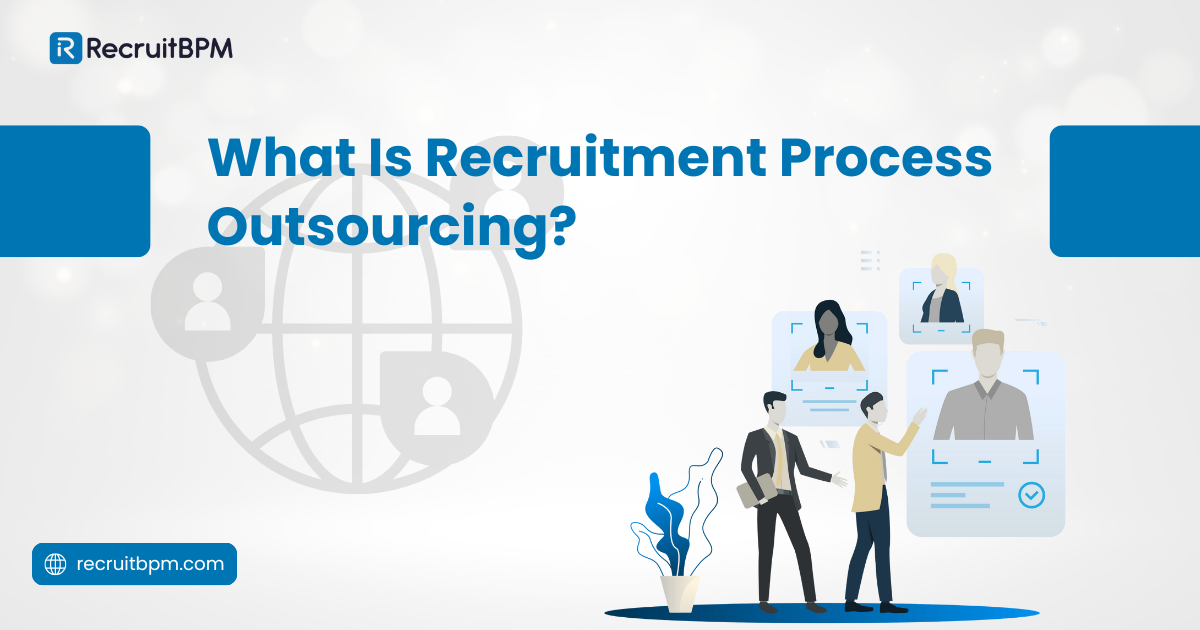Your hiring demands fluctuate constantly. One month, you need 50 warehouse workers. The next time you’re searching for specialized engineers. Building internal recruitment teams for variable needs wastes resources. Recruitment process outsourcing offers a smarter solution.
What is Recruitment Process Outsourcing?
Recruitment process outsourcing transfers your hiring responsibilities to an external talent solutions provider. Think of it as extending your HR team with specialized recruitment expertise.
RPO differs fundamentally from traditional staffing agencies. Agencies fill individual positions on a commission basis. RPO providers manage your entire recruitment function strategically.
The scope ranges from partial to complete outsourcing. You might outsource high-volume roles while handling executive search internally. Or transfer everything to your RPO partner.
RPO providers become embedded partners rather than vendors. They learn your company culture, understand your hiring standards, and represent your employer brand. The relationship feels collaborative.
Cost structures differ from contingency recruiting, too. RPO typically charges per hire, monthly fees, or project-based pricing. You gain budget predictability, impossible with commission-based models.
Strategic value extends beyond filling positions. RPO partners provide workforce planning, employer branding, and talent market intelligence. You get consulting expertise alongside recruitment execution.
How RPO Works: End-to-End Process?
RPO engagement starts with thorough discovery. Your provider learns your business goals, hiring challenges, and cultural requirements. This foundation ensures aligned recruitment strategies.
Workforce planning comes next. RPO teams analyze your talent needs against business objectives. They identify hiring volumes, skill requirements, and timeline constraints. Strategic planning replaces reactive hiring.
Employer branding gets developed or refined. Your RPO partner creates compelling messaging that attracts target candidates. Career site optimization, job description enhancement, and recruitment marketing improve your positioning.
Sourcing uses multiple channels simultaneously. RPO providers access talent networks, leverage advanced search technologies, and tap passive candidate pools. Your reach extends far beyond job board postings.
Screening and assessment happen systematically. Candidates undergo skills testing, behavioral interviews, and background checks. Only qualified prospects reach your hiring managers.
Interview coordination eliminates scheduling headaches. RPO teams manage calendars, send reminders, and collect feedback. Your hiring managers focus on evaluation rather than logistics.
Offer management and negotiation leverage market expertise. RPO providers know compensation benchmarks and negotiation strategies. Acceptance rates improve significantly.
Onboarding support ensures smooth transitions. Some RPO engagements extend through new hire orientation. Retention improves when onboarding gets attention.
Continuous optimization drives performance improvements. RPO partners analyze metrics, identify bottlenecks, and refine processes constantly. Your recruitment gets better over time.
Types of RPO Models (Enterprise, Project, Hybrid)
Enterprise RPO represents comprehensive outsourcing. Your provider manages all recruitment across all locations and business units. This model suits large organizations with complex hiring needs.
Long-term partnerships characterize enterprise RPO. Contracts typically span multiple years. Your provider invests in understanding your business deeply. Transformation happens gradually as processes mature.
Project RPO targets specific hiring initiatives. You might outsource seasonal recruitment, new location launches, or specialized talent searches. These engagements have defined start and end dates.
Flexibility makes project RPO attractive. You scale recruitment capacity up for busy periods without permanent hiring. Costs remain variable, aligned with actual needs.
Hybrid RPO combines internal recruiting with outsourced support. Your team handles strategic activities while RPO partners execute tactical work. Or you divide responsibilities by function, geography, or business unit.
This blended approach offers a gradual transition. You maintain control over critical hiring while gaining efficiency elsewhere. The model adapts as your needs evolve.
On-Demand RPO provides recruitment support as needed. You access RPO services without long-term commitments. This works well for smaller organizations testing outsourcing benefits.
Benefits of RPO for Recruiting Agencies
Recruiting agencies gain surprising advantages from RPO partnerships. Scalability comes first. Handle client surges without hiring permanent staff. Contract volume fluctuates predictably.
Cost efficiency improves significantly. RPO providers charge less than maintaining equivalent internal recruiting teams. Your overhead decreases while capability increases.
Access to advanced technology is included. RPO partners invest heavily in applicant tracking systems, sourcing tools, and analytics platforms. You leverage enterprise-grade solutions affordably.
Talent market intelligence strengthens your positioning. RPO providers research salary trends, skill availability, and competitor activities constantly. Your client conversations become more consultative.
Compliance support reduces legal risk. RPO partners stay current on employment regulations and fair hiring practices. Your recruitment processes follow best practices automatically.
Quality improvements follow naturally. RPO specialization means better candidate experience, faster time-to-hire, and higher acceptance rates. Your client satisfaction increases measurably.
Competitive differentiation becomes possible. Offer enterprise-level recruitment capability regardless of your agency size. Win larger clients and more complex assignments.
Focus on relationship building rather than execution. Your team concentrates on client development and candidate relationships. Administrative work gets handled externally.
RPO vs Traditional Staffing: Key Differences
Traditional staffing agencies fill specific positions reactively. Clients request candidates, and agencies respond. The relationship stays transactional.
RPO provides proactive workforce solutions. Your provider anticipates talent needs and builds pipelines preemptively. Strategic planning replaces last-minute scrambling.
Commission structures motivate different behaviors. Staffing agencies maximize placement fees. RPO partners optimize overall hiring effectiveness. Incentives align better with client interests.
Exclusivity distinguishes RPO arrangements. Recruited candidates belong to you exclusively. Traditional staffing often presents the same candidates to multiple clients simultaneously.
Timeline perspectives differ significantly. Staffing focuses on immediate fills. RPO thinks long-term about talent strategies and employer brand development.
Accountability levels vary substantially. RPO providers own complete recruitment outcomes. Staffing agencies’ responsibility ends when candidates start.
Technology investment scales differently. RPO partners provide enterprise platforms. Staffing agencies often use basic tools.
How RecruitBPM Supports RPO Operations?
RecruitBPM’s platform powers efficient RPO delivery. The comprehensive combination of ATS and CRM eliminates tool fragmentation.
End-to-end workflow management keeps complex RPO engagements organized. Track multiple clients, hundreds of requisitions, and thousands of candidates simultaneously. Nothing falls through cracks.
Customization adapts to each client’s unique requirements. Configure workflows, approval processes, and reporting specifically. One platform serves diverse client needs effectively.
Collaboration features enable distributed RPO teams. Recruiters, coordinators, and client stakeholders work together seamlessly. Communication stays centralized and documented.
Client portals provide transparency automatically. Hiring managers view candidate pipelines, submit feedback, and track progress independently. Your team handles exceptions rather than status updates.
Analytics demonstrate RPO value clearly. Show time-to-fill improvements, cost-per-hire reductions, and quality metrics. Data-driven reporting strengthens client relationships.
Automation handles repetitive tasks efficiently. Schedule interviews, send assessments, and trigger notifications automatically. Your recruiters focus on relationship building.
Integration capabilities connect with payroll, background check, and assessment providers. Your RPO technology stack works together cohesively.
Scalability supports growth without platform changes. Handle 10 requisitions or 1,000 with the same system. Your technology grows with your RPO business.
Selecting the Right RPO Strategy
Start by analyzing your current recruitment challenges honestly. Where do bottlenecks occur? Which positions take the longest to fill? What costs you the most?
Consider hiring volume variability carefully. Highly fluctuating needs favor flexible RPO models. Consistent volume supports enterprise partnerships better.
Evaluate internal recruitment capabilities objectively. Strong teams might need only specialized support. Weak recruiting functions benefit from comprehensive outsourcing.
Budget constraints influence model selection significantly. Project RPO requires less upfront investment. Enterprise RPO delivers greater long-term savings.
Timeline matters for implementation success. Quick wins come from project engagements. Transformation requires enterprise RPO commitment.
Cultural fit determines partnership success. Meet potential RPO providers extensively. Ensure their approach aligns with your values.
Technology compatibility prevents integration headaches. Confirm RPO systems connect with your existing platforms. RecruitBPM’s open architecture simplifies integration.
Industry expertise adds tremendous value. RPO providers with your sector experience understand unique challenges. Ramp-up time decreases significantly.
ROI and Cost Models for RPO
Cost-per-hire models charge fixed amounts for each successful placement. Rates vary by position level and difficulty. Budget predictability makes financial planning easier.
This approach aligns provider incentives with your goals. They succeed when you get quality hires. Performance matters more than activity.
Monthly fee structures provide dedicated recruitment capacity. You pay retainers for the specified recruiter’s time. This works well for consistent hiring volumes.
Transaction-based pricing charges for specific activities. Resume screening, interview coordination, and assessment administration each carry separate costs. Flexibility suits variable needs.
Hybrid pricing combines multiple approaches. Base fees cover core services while per-hire charges apply to placements. Complexity increases, but alignment improves.
ROI calculation considers multiple factors beyond direct costs. Include time savings for hiring managers, reduced bad hire costs, and improved productivity from faster fills.
Most organizations see 20-40% cost reduction from RPO partnerships. Savings come through process efficiency, technology leverage, and specialized expertise.
Soft benefits matter too. Better candidate experience strengthens employer brand. Improved hiring quality drives business results. These advantages justify investment even without hard cost savings.
Conclusion
Recruitment process outsourcing transforms how staffing agencies and corporate recruiters approach talent acquisition. Strategic partnerships replace transactional vendor relationships.
The flexibility of modern RPO models means solutions exist for every situation. Whether you need project support or enterprise transformation, options align with your requirements.
Technology platforms like RecruitBPM enable RPO effectiveness. Integrated systems manage complexity while maintaining transparency and collaboration.
Success requires choosing the right RPO model and partner carefully. Evaluate your specific needs, challenges, and goals thoroughly. Select providers whose expertise and approach match your situation.
Start with clear objectives and success metrics. Define what improvement looks like quantitatively. Measure results consistently throughout the engagement.
The competitive landscape demands recruitment excellence. Organizations using strategic RPO partnerships consistently outperform those struggling with outdated approaches.
Your talent acquisition becomes a competitive advantage rather than an administrative burden. Quality improves, costs decrease, and hiring speed accelerates simultaneously.
Ready to explore RPO benefits for your organization? Discover how RecruitBPM’s platform powers successful recruitment process outsourcing programs.

















